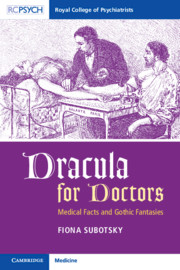'If, as Dr Subotsky tells us, it takes being bitten by a bat to produce a book of this depth, detail but also fun, then I recommend bat bites to all aspiring authors.'
Professor Sir Simon Wessely - Regius Chair of Psychiatry, King’s College London
'Fiona Subotsky is uniquely placed to deliver a consistently refreshing, informative and insightful account of the medical contexts informing Bram Stoker’s vampire. Both a work of Gothic scholarship and a compelling medical history, this is exactly the kind of book the emergent field of Medical Humanities needs. Rigorous yet fun!'
Roger Luckhurst - University of London, editor of The Cambridge Companion to Dracula
'But not just for doctors, and not just about Dracula! For students and enthusiasts of 19th-century gothic fiction, topics such as lunatic asylums, diagnosing disease, blood disorders, hypnotism, catalepsy, operations and medical experimentation, are explored not only in Stoker’s Dracula, but in the work of Le Fanu, Kipling, Wilkie Collins, Conan Doyle, H.G. Wells, R.L. Stevenson and others.Dr Subotsky examines published contemporary medico-psychological source materials (and their resulting controversies), and applies them to our favourite vampire novel. Meticulously researched and referenced, this is an entertaining, thoroughly engrossing work of scholarship.'
Julia Kruk - Chair of the Dracula Society
‘Whether your interest is that of the folkloric or the literary variety of fan, this is a well-informed and well-researched read.’
Deborah Wyde
Source: Fortean Times


